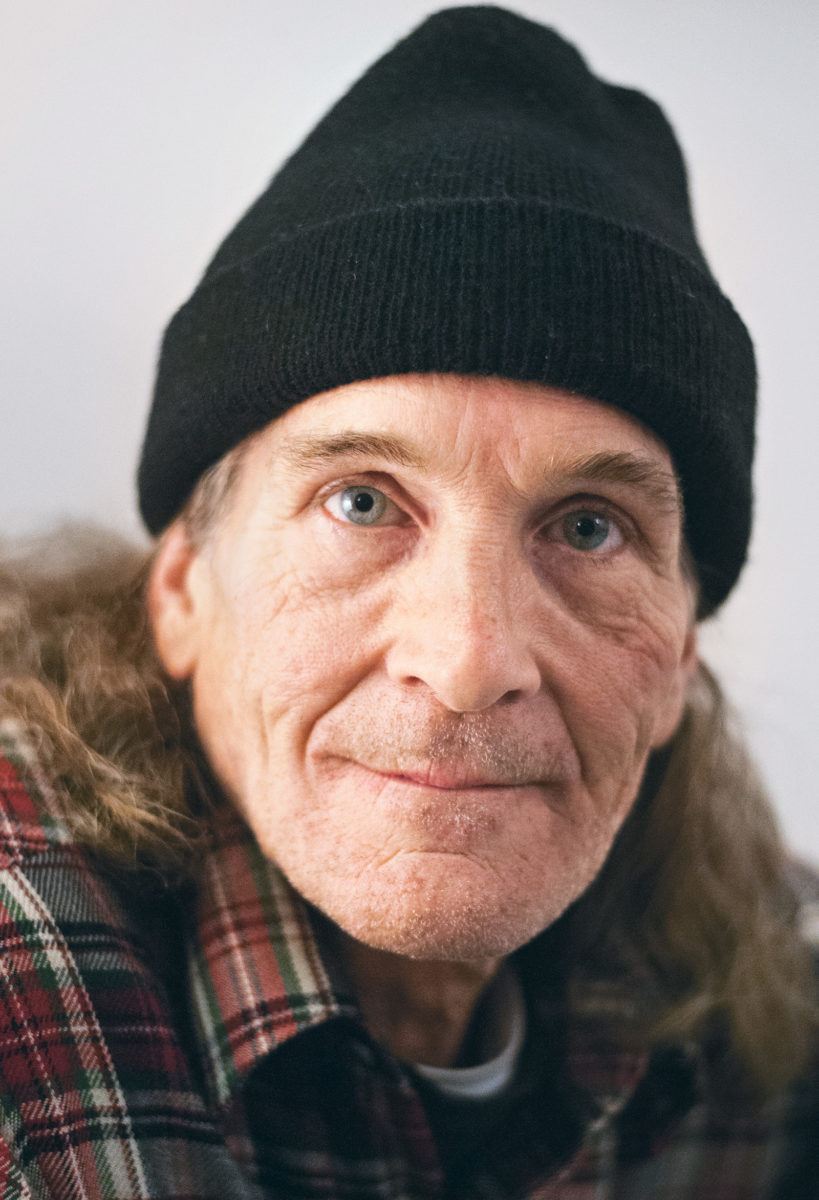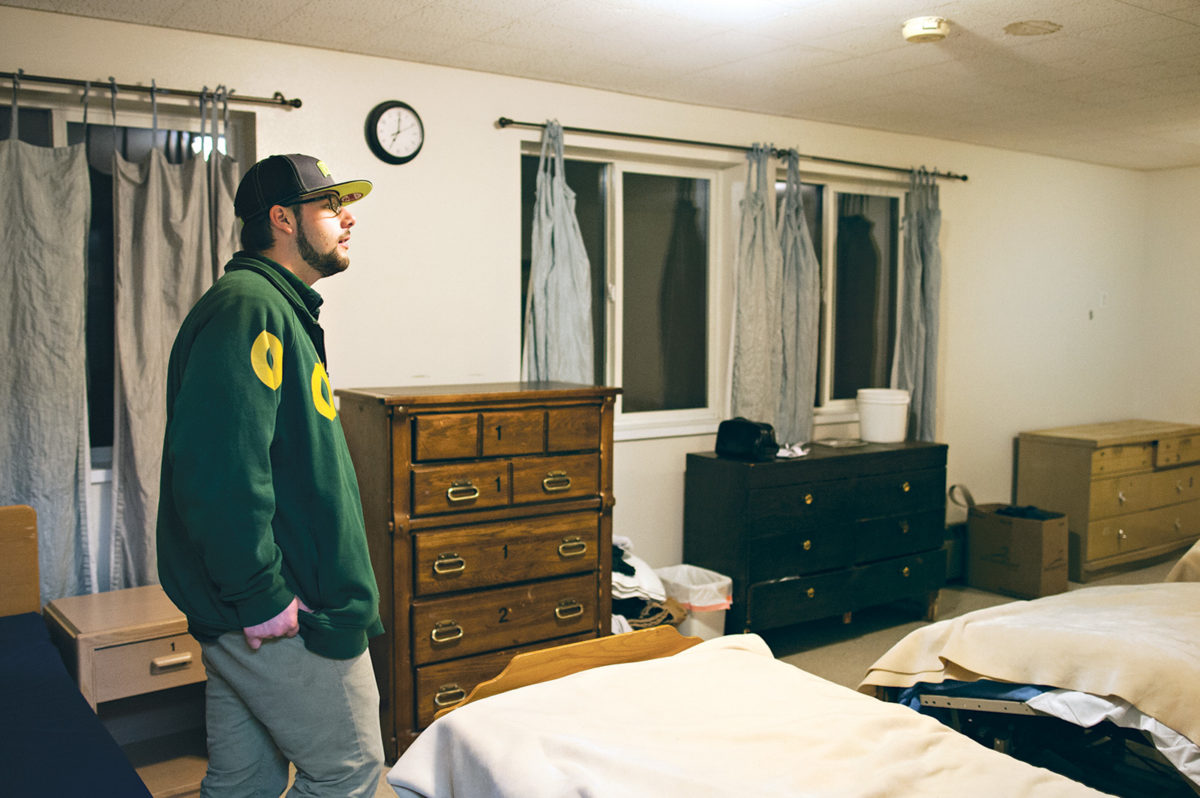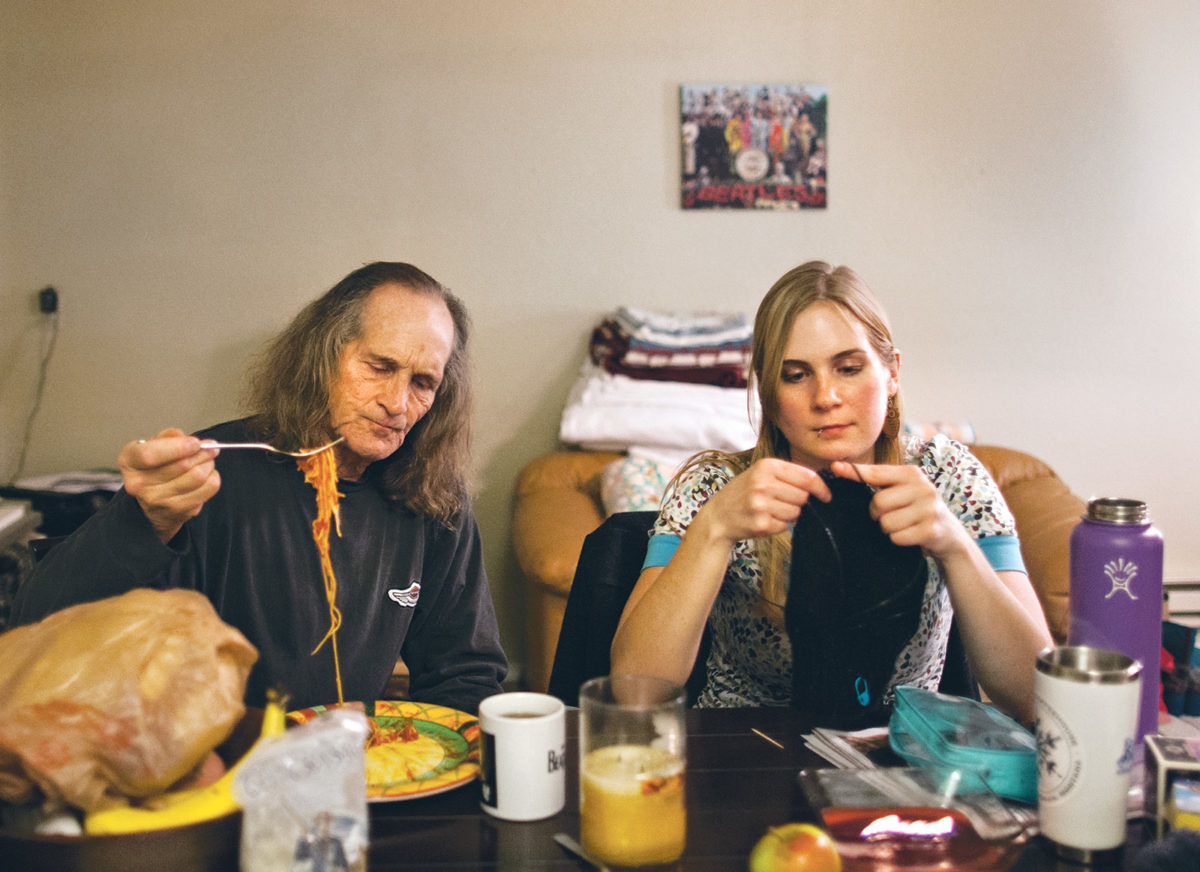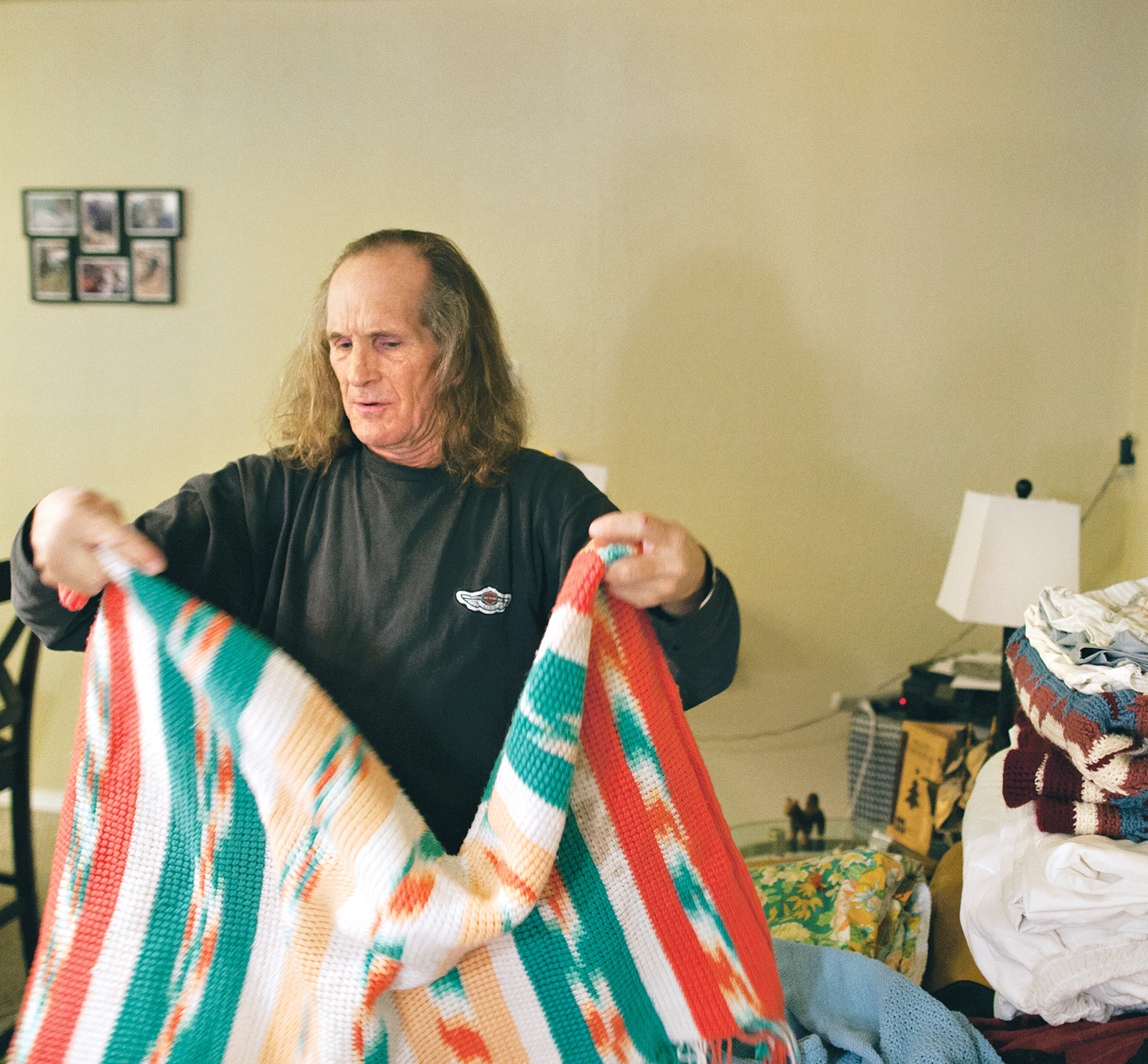Richard Scherrer doesn’t belong here, amid the down-and-out and the destitute, the lost and the looking. Nobody does.
And yet here he is, the former airplane mechanic and Naval officer, the single father, the widower, massaging parts, piecemeal-style, into the busted-down ‘83 Ford Econoline he’s lived out of for the past six years, the van he and his late wife, Lisa, bought as newlyweds, high school sweethearts determined to make it in this wild world, pedigreed and with good jobs, happy and expectant, a family on the way.
Here he is, homeless.
At first blush, Scherrer, 55, fits the stereotype of the indigent street person, his hapless providence easy enough to compartmentalize and pigeonhole. A shock of shoulder-length, sandy brown hair is accented with streaks of gray and protrudes from beneath a wool-knit stocking cap. His teeth are in short supply and his hands are knotted and crabbed, bearing the leathery lineaments of a laborer.
But then, Scherrer is trim and ruggedly handsome, soft-spoken and articulate, magnetic even. His eyes are a pale but piercing blue, and they bear a twinkle that often seems on the verge of tears. He wears a crisp wool plaid shirt tucked into Levi’s — still a 31 waist — and when his daughter, Molly, picks him up from the shelter where he’s been living he has combed his hair back and is clean-shaven.
He speaks with a soothing, rhythmic lilt, gazing intently past his listener as he coaxes agonizing details from the deep, painful recesses of his memory.
As soon as he begins telling his story, the stereotype breaks down further, fragmenting as he describes the devastation wrought by his wife’s death, combusting as he swells with fatherly pride at every mention of the successes and talents of his children, both college graduates living in the Flathead Valley, deflating as he talks about the sacrifices, the broken dreams and the heartache that might just as easily have befallen anyone.
“I just wanted to go out of my way to make sure my kids had their dreams, because mine were kind of dashed,” he says, his voice cracking. “I shelled out everything I had left to send them to college, and that’s kind of when I became homeless. I haven’t had an address in six years.”
A little more than a month ago, following the cold snap, Scherrer decided to come in from the outdoors, mainly because he didn’t want to endure a repeat of last winter, when he contracted pneumonia. So he limped his Econoline, outfitted with a cot, sleeping bag and portable toilet, out of the Super 1 parking lot in Kalispell, where he’d been sleeping, and parked it alongside the curb outside the Samaritan House, where he’s been bunking in a “vet pod” with two other veterans, both of them hard workers with similar stories in which circumstances conspired to deal them infelicitous doses of misfortune, their lives derailed by the unpredictable saboteur of fate.

Justin Turville, 37, fractured both tibial plateaus in 2007 during combat training at Fort Knox, Ky., the U.S. Army post where he was stationed. His wife, Misty, took care of him as he recuperated, and the couple moved back to Anaconda to raise a family.
Three years later, Misty was in a devastating car crash near Fairmont Hot Springs. Her legs were broken, her vocal chords crushed, her lungs were bleeding. She was in a coma for two months.
“Up until the car wreck, besides my injury, we had pretty much the perfect life. A house with a two-car garage, a white picket fence and two children,” Turville said. “She was supposed to be a vegetable, but she woke up and remembered me. We were lucky. Still, it’s not easy being homeless on the street with a wife in a wheelchair.”
The couple was crippled by debt and the painkillers doctors prescribed Turville for his injury became habit forming. He couldn’t cope, needed help and now he’s waiting to transition from the Samaritan House to a drug treatment facility in Sheridan, Wyo., where homeless veterans can live during treatment, re-acclimate and start anew.
Fifteen years Turville’s senior, vet pod bunkmate David Willert describes his roommates as “like brothers.” Willert came to Kalispell by way of Nebraska, where the anguish of a divorce drove him north to be closer to family. A fellow veteran, Willert is working as a horse trainer but hasn’t yet come up with enough cash for a rental home.
“This last year has been really tough,” he said. “But I’m a hard-working man.”
And so for now, Willert lives with Turville and Scherrer at the Samaritan House, hoping to save up enough money for first- and last-month’s rent, a security deposit, some modest furnishings. He doesn’t need much, he says.
Beyond the walls of the Samaritan House, the roommates belong to a tribe of between 400 and 500 men and women who are homeless in the Flathead Valley, many of them employed and working to support families, many of them with injuries or health problems that drained bank accounts, some of them with pressing legal issues or undiagnosed mental illness.
Any one of them could be a friend or relative, seemingly normal, their stories of ill fortune strikingly ordinary.
“The face of homelessness today isn’t what’s portrayed in the Dickens’ novels,” Samaritan House staff member Cynthia Geer said. “It’s not bums and hobos. It’s waitresses and bank tellers and divorcees. The classic stereotype is not the reality. Many people are just a paycheck away from being out on the street.”
The Flathead Valley consistently has the third-largest homeless population in the state, according to the 2012 Montana Homeless Survey, sponsored by the state’s Department of Public Health and Human Services. Last year there were 428 homeless in the valley on any given day, based on a six-year average. Only about 10 percent are chronically homeless, while most are “episodically homeless,” meaning they’ve fallen on hard times without a safety net.
“The scenario is complex. It’s multi-layered. There are shades of gray,” said Chris Krager, director of the Samaritan House, the largest homeless shelter and transitional housing facility in Northwest Montana. “Not everyone is going to fall into convenient categories. The best way to address the whole homelessness and poverty issue is to role up your sleeves and spend time in the muck and the mire of their situation. It’s messy. Their stories can be complex, they can be heartbreaking.”

Scherrer was born in Westchester County, New York, but his story of heartbreak begins in 1972, when his father took a job with a regional Associated Press office in Dallas, Texas, and the family moved to nearby Wylie, Texas, where he attended high school and met his future wife, Lisa.
Lisa played clarinet in the well-known Wylie High School marching band, and saxophone in the stage band; Scherrer played timpani in the marching band and drums in the stage band. A shared affinity for music led to an instant attraction, and the teenage couple began dating.
“That band was famous,” Scherrer recalls. “We made records and toured around.”
Sadly, Lisa moved overseas for a period during high school when her father, who worked in upper-management at the Dallas-based Texas Instruments semiconductor company, accepted a job in France and then Germany. Scherrer recalls being overjoyed when the family returned to the Dallas area, and a friend told him he’d spotted Lisa around town.
“I was so excited. She was the only relationship I’ve ever had and I’ve been alone ever since she died,” he said. “I just couldn’t move on.”
They graduated in 1976 and Scherrer joined the U.S. Navy and was stationed at Naval Station Norfolk in Norfolk, Va. Meanwhile, Lisa went to nursing school and was recruited by the U.S. Air Force to work as a midwife. The couple married in 1979 and in 1983, while living on Luke Air Force Base near Phoenix, they bought the Econoline, the one parked outside the Samaritan House, desperate for a new radiator that Scherrer can’t afford.
“That was our first car as a married couple,” Scherrer said.
Seeking a degree, Scherrer studied aircraft maintenance at the Hallmark Institute of Technology in San Antonio, Texas, graduating in 1986, one year after the couple’s son, Michael, was born. He found work performing C and D Checks on 747s at a large aircraft maintenance and storage facility in Marana, Arizona, where he converted commercial airplanes to cargo planes.
But with Michael approaching school-age and another baby, Molly, on the way, Scherrer put his career on hold to help raise the children. The couple decided to homeschool Michael and Molly, offering them a well-rounded education even as their jobs took the family from Tucson, Ariz., to Fairbanks, Alaska, to Barstow, Calif. and Boise, Idaho.
“First grade math was taking a calculator with us to the grocery store and science was digging up worms,” he said of the lessons, recalling how Michael was reading Jack London’s “Call of the Wild” at the age of 5.
The family moved to Garden Valley, Idaho, and Lisa pursued her master’s degree while working at the hospital in Boise as a neonatal intensive care nurse. Despite the long shifts, she also took a job teaching health occupation at a school for troubled teens.
“I didn’t want her taking that job. She was a workaholic and I worried about her working 12-hour shifts at the hospital and then going to school,” Scherrer said. “And then one day the police were at my door. She fell asleep and rolled her Jeep.”
The news sent Scherrer’s world spinning off its axis, and Michael and Molly were the only ballast keeping him anchored.
“I just felt defeated in a way. I didn’t have any light at the end of the tunnel,” he said.
The couple had been renting out their home in Texas, and Scherrer let it foreclose.
“I walked away from the house and let it go back to the bank. I was just defeated,” he said. “My kids were the only reason to live. I didn’t really care about anything else except them. That was my mission and I wanted to raise them just as she would have if she hadn’t died. I just couldn’t deal with anything else.”
He poured his energy into making sure both children received a quality education, eventually settling in Whitefish where he started a business as a wildlife photographer.
“Everything came to an end so I moved to Montana just because it was far away, far from all those memories haunting me,” he said. “I was going to make sure they both graduated from college if it killed me. And I’d do it again in a heartbeat.”
“I was all they had,” he added.
Michael eventually attended Whitefish High School and, later, went to Full Sail University in Winter Park, Fla., where he studied digital arts and entertainment.
Molly (short for Monica, the name her mother chose) graduated from Flathead High School in 2007 and recently graduated from the University of Montana in Missoula with a degree in music education. She learned to play on her mother’s clarinet and she’s now student teaching in Bigfork. Her father recently spent a weekend in her cramped apartment on Echo Lake.
The year Molly graduated was the same year that Scherrer last had a street address. His business slowed and he had no steady income, and so he retrofitted the van and began sleeping out, making brief sojourns to visit his dying mother and to see his son in Florida.
“I just kind of gave up. I couldn’t get work,” he said. “I got used to thinking of myself last. I didn’t think I was going to be here so long and dedicated all my time and money to making sure my kids would be OK in this changing world.”
“I hate it,” Molly said of her father’s situation. “It was hard in college because I was in Missoula and couldn’t do anything. I didn’t know if he was eating. At least now with [the Samaritan House] I don’t have to worry. I’ll look at the weather and see that it’s minus-20 degrees and he might be outside.”
“People are so callous about homelessness. They don’t know that it’s not as easy as just, ‘get a job, dirt bag,’” she said. “People don’t get it.”
In previous years, Scherrer has found someone to stay with during the harshest winter months, including Molly and Michael. But last year, Scherrer slept out in the cold and contracted pneumonia. This year, anticipating a bitter winter, he sought out the Samaritan House.
“I didn’t know where to go and I didn’t want to ask for help. I was too proud, I guess,” he said. “I knew the winter was going to be bad, and I’ve known this place existed but I thought it was for people who needed it more than I did. I didn’t want to admit that I needed it. I didn’t want to need it.”
Three years ago, a 56-year-old out-of-work long-haul truck driver from the Flathead Valley, Jeff Tolson, died of hypothermia while sleeping inside his car. He didn’t think he needed it, either. Or he didn’t want to need it.
Tolson had lost the last of his truck-driving hours at an outfit based in Colorado and returned to Columbia Falls to look for work. He was sleeping in the parking lot of Cardinal True Value Hardware during December’s first cold snap, according to police officers who had given him food and coffee, and was keeping warm at night with an electric blanket plugged into the four-door sedan’s cigarette lighter.
He’d been staying in his car three nights when the battery died in temperatures that fell to 5 degrees. An officer discovered him at about 6 a.m., cold to the touch but with a faint pulse; medics were unable to revive him.
Police said Tolson had been confident enough about his situation that he politely refused officers’ earlier suggestions that he seek shelter and services at the Samaritan House or Salvation Army.
The officer who found Tolson had talked to the man the previous day, and learned that he’d been out of work for about two weeks and intended to live out of his car until he found something stable.
His son, Ian, who was living in Whitefish at the time, said he didn’t know his father was in town at the time of his death, and had last seen him a month earlier over dinner.
In the days before his death, Jeff Tolson had spent what little money he had on Christmas gifts at the Dollar Plus Store, adjacent to the hardware store parking lot where he died.
Two years ago, Scherrer posted an ad on Craigslist offering to help people move for cheap rates. It’s not dependable work, but it’s allowed him to earn enough money to buy a clutch for the van and a water pump, both of which he installed himself.
“If I get hired for another move or two I should have enough for the radiator,” he said.
Recently, Scherrer was a finalist in an interview as the maintenance worker at an apartment and condo complex in Whitefish. He felt the interview went well, but he wasn’t hired. He thinks it may be due to the stigma attached to homelessness. Although he didn’t admit he was homeless, the address he wrote on his resume was care of his daughter.
“I’m getting kind of used to it,” he said.
“Before I came here I was living in my van but I had so much hope of getting out of there. I tried everything but I just kept falling on my face. I’m good at everything I try. I just don’t know what I did,” he said. “And then I started losing my teeth. That was hard. Everybody started looking at me different, and thought I was a meth addict. All the men in my family lost their teeth at my age.”
His children are involved in Scherrer’s life. They cook and share meals, take him shopping and buy him clothing and shoes, and he often stays with them for brief periods. But he doesn’t want to burden two young twenty-somethings trying to find their own way.
“They call me and take me shopping and buy me nice shoes that I can’t afford,” he said. “They’re very generous. But I don’t want to be in the way.”

On a recent weekend, Scherrer and Molly cooked a Sicilian dish called Purpette a la Passula at her apartment, and plan to make their special holiday chili, which is loaded with peppers, on Christmas. He enjoys cooking and has considered trying to turn his culinary interests into a profession.
“The things that don’t make you much money are the things I like,” he said. “Art, cooking, photography, mechanic-ing.”
And he likes talking about Lisa – “I like talking about her. I want people to know how wonderful she was.”
For now, he’ll continue to save up enough money for a new radiator in his Econoline, which, it occurs to him, he’s owned for exactly three decades.
“I guess I can’t complain.”
